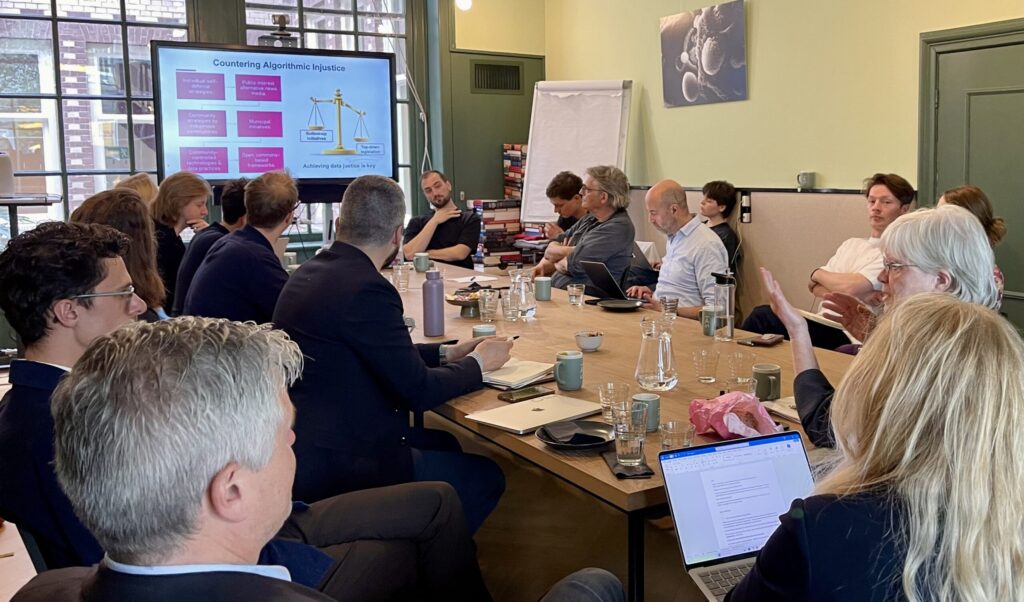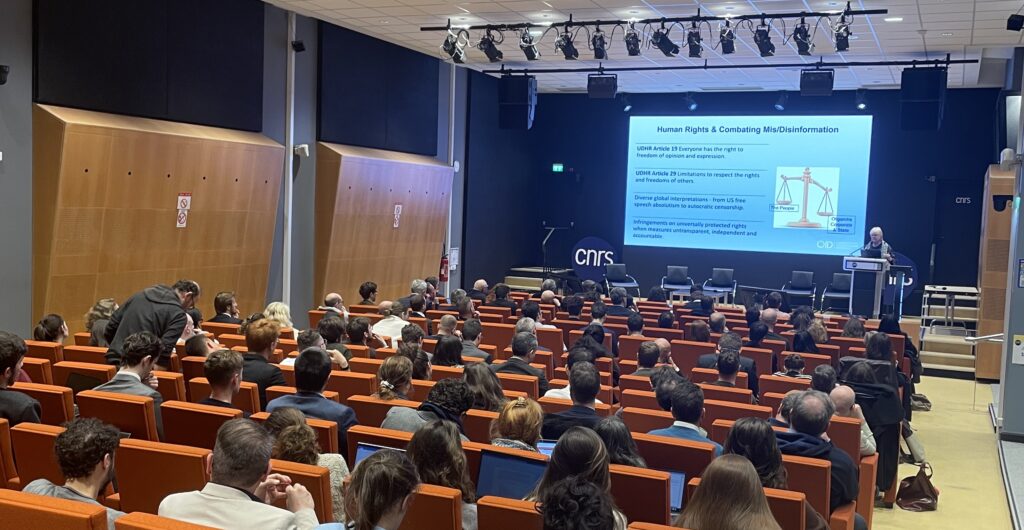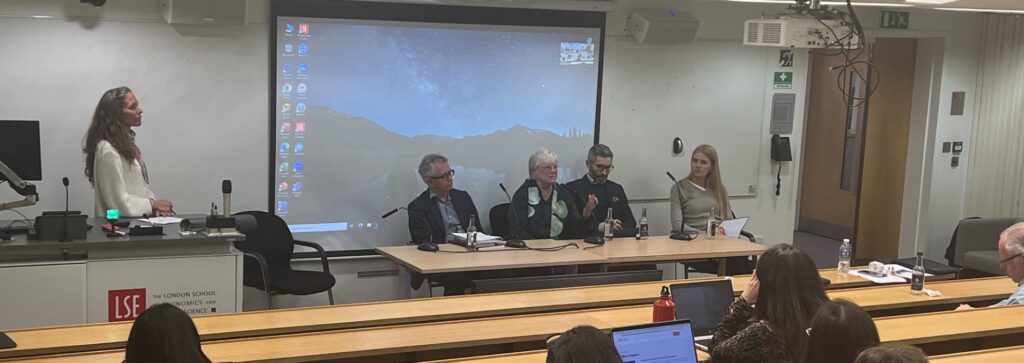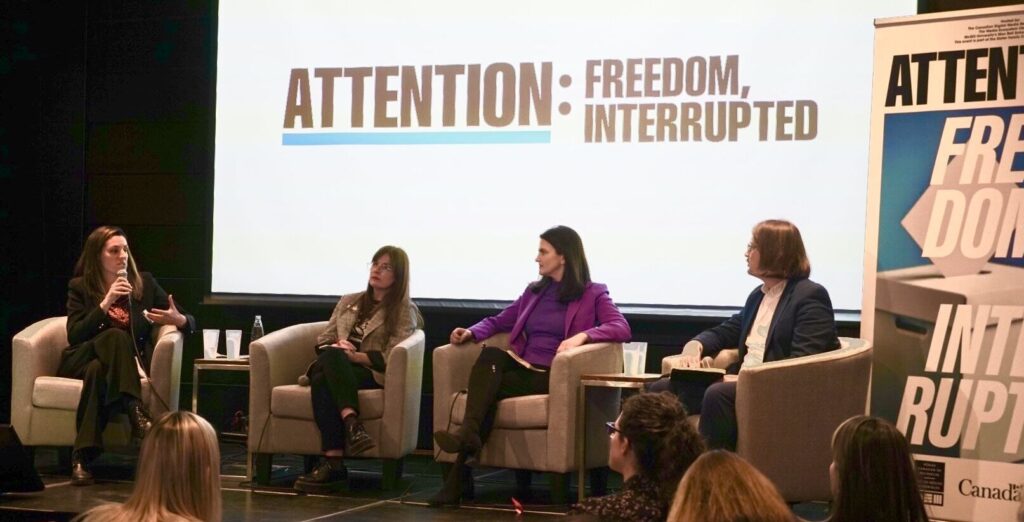On Tuesday, 15 April 2025, the Observatory on Information and Democracy (OID), in partnership with the AI, Media & Democracy Lab (AIMDL) and the AlgoSoc research consortium, hosted an event at the Institute for Advanced Study in Amsterdam.
The meeting marked a new stop in the global dissemination of the Observatory’s landmark report Information Ecosystems and Troubled Democracy, and focused on the applicability of the policy recommendations within the Dutch and broader EU context.
The event opened with introductory remarks from Camille Grenier, Executive Director of the Forum on Information and Democracy, and Sara Spaargaren, Manager of the AIMDL. Natali Helberger offered a presentation of the ambitions of AlgoSoc, a major interdisciplinary program supported by the Dutch Ministry of Education, Culture and Science.
Structural power asymmetries between Big Tech and news media in the digital media ecosystem
The first panel examined the digital power dynamics affecting media ecosystems, especially the growing imbalance between tech platforms and news media institutions. The discussion was animated by:
- Flavia Durach, Associate Professor at the National University for Political Studies and Public Administration, Bucharest, and Rapporteur for the OID, who presented her research on disinformation threats at the European level and the dynamics between media and online platforms.
- Thomas Poell, Professor of “Data, Culture & Institutions” at the University of Amsterdam, and co-author of “Platforms and Cultural Production” (Polity, 2022). He explored the power accumulation of online platforms, relying on his research on digital economies and AI.
The event relied on several chapters of OID’s reports, namely Chapter 2, News Media, Information Integrity and the Public Sphere, which explores how the asymmetrical power relations between traditional news media organizations and online news media led to an ‘information crisis’; Chapter 3, Artificial Intelligence, Information Ecosystems, and Democracy, the interdependencies between AI-driven content moderation and democratic processes; and Chapter 4, Big Tech Power and Governing Uses of Data, underscoring the role of monopolistic actors in data extraction and use and their influences on political deliberation.
Informing evidence-based policy-making for a troubled media ecosystem
Robin Mansell, Scientific Director of the OID and Professor Emeritus at the Department of Media and Communications, LSE, and Natali Helberger, of AIMDL/AlgoSoc, presented how evidence-based policymaking can help address the issues facing the media ecosystem today.
The discussion was based on the report’s conclusions, Chapter 9, Section 6. They highlighted the need for adopting a comprehensive policy approach, in coordination with civil society organizations and academic institutions, to address the systemic issues preventing the development of democratic resilience.
Empowering news media: Evaluating policy recommendations in the Dutch/EU context
Finally, the main session, facilitated by Claes de Vreese, Professor of Artificial Intelligence and Society at the University of Amsterdam, and researcher at the AIMDL and AlgoSoc, focused on translating research into policy recommendations and assessing their feasibility in the context of the Dutch and EU landscapes.
The discussion addressed the role governments can play in building enabling environments for media sustainability through direct funding or other policy areas. It also emphasized on the need for more data evidence to enforce already existing regulations, stressing on the need for research to interface policy.
Proposals for future action included calls for further research, notably on analysing the exclusions and inequitable inclusions through algorithmic models, how human rights and freedoms are impacted by these structural inequalities and tech biases, and, ultimately, how to reimagine data governance and democratic processes.
Closing reflections
This event contributed to explore how our landmark report can inform policy action in Europe and to contextualize the global findings in national contexts. Research priorities identified, call to action..
We extend our sincere thanks to the organizers, speakers, and participants for these enriching discussions. To explore further, we invite you to read our full report and its executive summary in both French and English and to explore our interactive tools.
📌 Information Ecosystems and Troubled Democracy Global Assessment Report
📌 Executive Summary in English
📌 Interactive Report Literature Data Map






